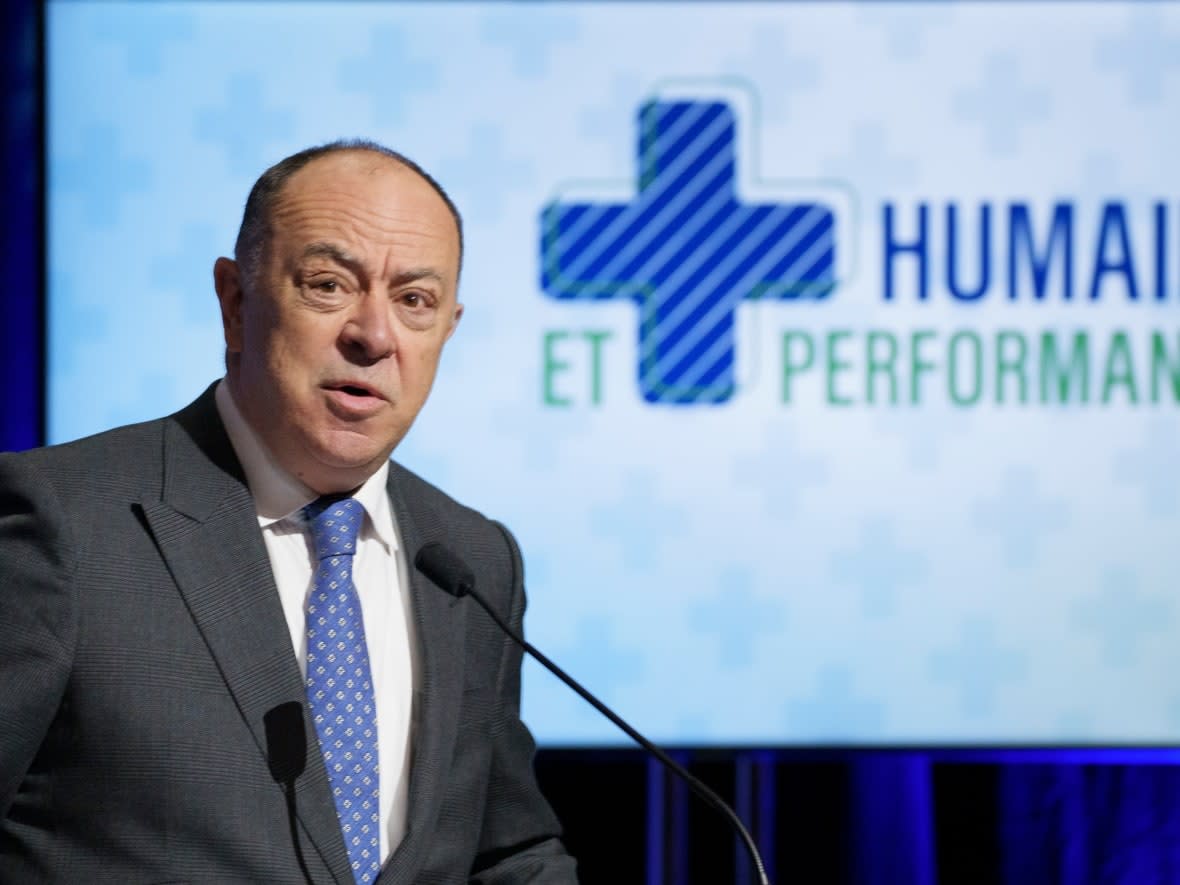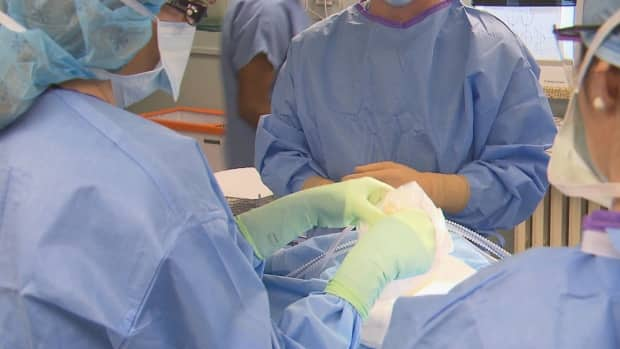New Quebec health plan promises better access to care, improved working conditions for nurses

Quebec unveiled its plan to heal its beleaguered health care and social services system over the next three years, with a focus on accelerating access to front-line health services through a one-stop phone service, reducing emergency room wait times and improving working conditions for nurses.
But opposition parties are slamming the document, describing it as more of an electoral platform than a detailed plan for health-care reform.
The plan, outlined in a 90-page document called "Human and Efficient — Plan to implement necessary health changes," highlights some solutions to the system's challenges made worse by the pandemic, including lack of personnel, rising costs, and an aging population.
Health Minister Christian Dubé and Lionel Carmant, Quebec's junior health minister, rolled out the details of the plan Tuesday morning.
Dubé said one of his key objectives is to ensure all Quebecers have "the best patient experience and that they are proud of their health system."
Among the 50 proposed measures, which were leaked in a document obtained by Radio-Canada last week, are eliminating mandatory overtime for nurses, hiring of 3,000 new clerks by the end of the year to take on some of the paperwork, more home-care services for seniors, modernizing access to medical data and the creation of electronic health records accessible to patients.
WATCH | Christian Dubé explains why Quebecers should trust his government's plan:
The new health plan document doesn't include costs, but Dubé pointed to a budget increase of 6.3 per cent for the health system in the coming year.
Last week, Finance Minister Eric Girard said that increase will be put toward the revamping of the system.
But money is only part of the solution, Dubé said.
"It takes more than money — it takes a willingness to work differently."
However, Parti Québécois Leader Paul St-Pierre Plamondon said the plan is too short on details and financial commitments.
"With a few months until the elections, they come up with all those things [that are] not measured, no figures and no precise targets," he said.
One-stop service for Quebecers without family doctors
The government plans to change the way family doctors are paid, from a per-act to a per-patient basis, in an effort to get those doctors to take on more patients.
There are some 945,000 Quebecers who are still on the official waiting list for a family doctor, according to the document, but it's estimated the actual number of people without one is closer to 1.5 million.
Dubé said the government is still working on reducing the number of people on that list. But the government is backing away from a promise made in 2018 to get everyone a family doctor by the end of the CAQ government's first mandate this year.
WATCH | Health plan doesn't address 'the real needs,' family doctor says:
The plan now calls for stepping up alternatives for front-line care, including giving nurse practitioners, paramedics and pharmacists more power to treat patients.
Under the plan, Quebecers will call a phone number which would act as a one-stop service, known as the guichet d'accès à la première ligne (GAP), where a nurse would direct patients to the appropriate medical service, whether that's seeing a doctor or lining them up with some other method of care.
"It's not only theoretical. It's already started," said Dubé, who pointed to a pilot project in the Lower Saint-Lawrence region.
Dubé said he hopes that "the majority" of people without a family doctor will be able to use the one-stop service by the end of the summer. However, that service was already supposed to be in place across the province by March 31.
The junior health minister, Carmant, underlined that the service will be managed regionally and will be accessible in English.
The hope is that under this plan, fewer Quebecers would need to go to a hospital emergency room for health issues that could be treated elsewhere.
But Liberal Leader Dominique Anglade said a phone line is not a replacement for a family doctor.
"That one person knows your file, knows your history," she said. "They can ensure a follow up, and for clinical problems, this is really fundamental."
Federation of family doctors welcomes plan
The federation representing general practitioners in Quebec supports the idea of the one-stop service, saying it could help match patient needs with the professional who is best-suited to address their needs, whether that be a nurse practitioner or a social worker.
Dr. Marc-André Amyot, president of the Fédération des médecins omnipraticiens du Québec (FMOQ), says with a shortage of 1,000 family doctors in Quebec, his members cannot shoulder the entire burden of addressing all front-line health-care needs.
"We cannot ask family physicians to do more and more and more. We have to think differently," he said.
Amyot was pleased the document mentions the need to place more value on the work of family doctors, as he said it's not a specialty that medical students find attractive. He said 400 residency positions in family medicine have gone unfilled since 2013, with 75 open spots in the last year alone.

The government also aims to reduce the wait time in every emergency room to no more than 90 minutes, the document states.
Every hospital would have a "command centre" staffed by workers from different sectors, including the at-home care team and mental health professionals.
The centre would aim to discharge patients as soon as their condition is no longer critical but would ensure the patient "continues to benefit from services outside the hospital if their state of health requires it."
Improving work conditions
Many measures are aimed at creating a "more attractive work environment" for health-care professionals, particularly for nurses.
To that end, the government is promising to overstaff the system, to enable it to handle absences without relying on forcing nurses to work overtime.
Dubé said his government has been monitoring how often mandatory overtime is used, and pointed to a recent month when it happened "only 27" times that a nurse was forced to stay at work because there was no replacement for the next shift.
"There is a will, a very clear will, not to do it," he said.
The government plans to undertake a "massive" recruitment campaign, including hiring more than 1,000 nurses from abroad.
Each establishment would also be allowed to manage its own schedules, with input from staff.
The government also wants to reduce the system's reliance on private agencies to provide temporary nurses and nurses' aides. Right now many hospitals and long-term care homes rely on those agencies to fill positions when they are short-staffed, at a higher cost.

In a joint statement, unions representing health-care workers said Dubé's plan included "laudable objectives," but they worry it could amount to a "vast public relations exercise" ahead of the provincial election.
The unions also expressed concerns about the government's intention to turn more often to the private sector, notably to deal with surgical backlogs. They said this could make it even harder to recruit personnel to the public sector and called for a moratorium on "all new privatization projects."
Caroline Senneville, president of the Confédération des syndicats nationaux (CSN), said while the pandemic forced the government to work with unions and health-care workers to find quick solutions, it needs to continue to do so if it wants to fix the health-care system.
"We need the government to speak to us not only when it's in trouble, but also over the long run," she said.


